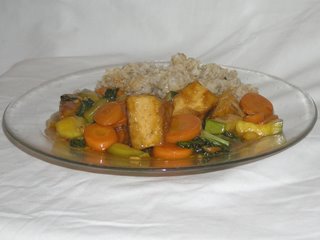And some other things:
1 lb. shelling peas
1 lb. sugar snap peas
2 bunches carrots
3 lbs. zucchini
1 bunch collards
1 bunch red Russian kale
1 bunch Swiss chard
1 head French crisp lettuce
1 bunch Italian parsley
1 bunch scallions
1 bunch "garlic balls" (immature heads of Rocambole garlic)
1 qt. strawberries
1 lb. cherries!!!!!!
Total spent: $43
Unfortunately Terhune Orchards doesn't have cherries yet this season. I hope they will; they didn't have any asparagus at all, and theirs was my favorite last year. The ones I got from Locust Grove are delicious, but slightly short of spectacular. (Though it is early for cherries, and I'm sure all this rain hasn't helped anything.)

While I waited for the subway today, laden with bags of vegetables, I looked at the mass of various green leaves sticking out of my market bag, and I mentally compared my leaf-eating self to the brontosaurus from an elementary-school textbook, craning my long neck up to munch green bites out of trees. This is by no means the first time I've had this train of thought.
But then I started thinking, inevitably, about the brontosaurus, who now, we all know, was not real. When I was a dinosaur-loving kid (as so many bookish types are), I remember feeling very confused and a bit betrayed by scientists for making us believe in a dinosaur that turned out to have been constructed erroneously, using bones from more than one creature. It wasn't as though brontosaurus was some peripheral dino that was easily dispensed with - this was one of the canon, along with stegosaurus, triceratops, and pterodactyl, featured on those plastic mugs we all had. And all of a sudden, we're supposed to start rooting for this tiny-headed "apatosaurus" character? Worst of all, everyone pronounced "apatosaurus" differently.
Apparently the subway was taking its time to arrive, because I considered further that perhaps this was the seed of my now fully-blooming mistrust of science, which, of course, was nourished abundantly during my year at The Natural Gourmet. And I imagine today's generation of young bookish kids will have a similar reason for scorn because of the whole "Pluto isn't a planet" situation. Part of the reason I was thinking about this was a recent discussion one of the food sites I read about unsafe/scary foods, and the ongoing debate about margarine - with about half the posters concluding that because scientists say it's alright for you, then it is. It's really unbelievable to me that given the history of scientific mistakes threatening the public health (I mean, come on, DDT? Trans fats?), folks are still so willing to believe whatever today's scientific "wisdom" happens to be, when it comes to food.
 Don't get me wrong, I totally believe in evolution and quantum physics and stuff. But when it comes to personal health, I am much more likely to trust, say, farmers, or traditional cultures - even to a fault. It seems like science has had more trouble figuring out the human body and how it responds to nutrition, stimuli, etc., than they have had charting distant galaxies. (Though I suppose mistakes about human health confront us in a way that mistakes about neutron stars don't.) And I won't even get into the seemingly insurmountable conflicts of interest that exist in today's largely food-industry-funded nutrition research community.
Don't get me wrong, I totally believe in evolution and quantum physics and stuff. But when it comes to personal health, I am much more likely to trust, say, farmers, or traditional cultures - even to a fault. It seems like science has had more trouble figuring out the human body and how it responds to nutrition, stimuli, etc., than they have had charting distant galaxies. (Though I suppose mistakes about human health confront us in a way that mistakes about neutron stars don't.) And I won't even get into the seemingly insurmountable conflicts of interest that exist in today's largely food-industry-funded nutrition research community.In conclusion, re: almost entirely irrelevant subject matter - I am going to be eating a lot of vegetables this week, like every week, because eating vegetables is scientifically and non-scientifically proven to make you healthy. Not to mention: I love 'em. No big plans for this week's haul, though now that berries have started in earnest, I think I'll have to do my first jams of the year next week. I'll begin with strawberry-rhubarb if there's still rhubarb around.



